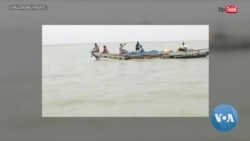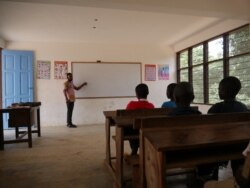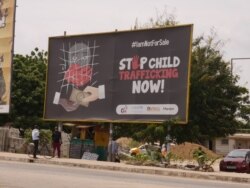Experts say an international convention universally ratified in August will give children legal protection against the worst forms of child labor. In Ghana, children are still used in hazardous labor, especially in fisheries and the cocoa industry. One Ghanaian non-governmental organization is making a difference by rescuing children from work and getting them into school.
When Stephen Addo goes out on missions to rescue children on Ghana’s Volta Lake, he thinks about his own experiences being forced to fish when he was a child.
Addo has been working for a decade with Challenging Heights, an organization that rescues and rehabilitates children trafficked from a coastal area of Ghana to be used on a lake hours away.
Child labor is a complex issue but generally comes down to poverty and ignorance, Addo says.
He finds parents are manipulated by traffickers with false promises of sending a child to school when in reality, children as young as five are forced to work.
The NGO focuses on advocacy and economic empowerment, so parents do not feel they need to send away their children. Education, health and behavioral support are offered at a rehabilitation center. Challenging Heights also works with parents with whom the children are eventually reunited.
Member countries of the International Labor Organization ratified the Worst Forms of Child Labor Convention in early August, but Addo says more funding and political will are needed to stop the problem.
“I am still happy the convention has been ratified, that is going to support the work that we are doing," said Addo. "It is going to be a source document for us, which we can refer to when we have difficulties, but we should still find a way of making those who ratify it responsible - not just sitting in the office and ratify. Come to the grounds and work as a team with the people who are implementing it and make sure it happens as we want it to happen.”
Child labor in Ghana and neighboring Ivory Coast’s cocoa sector is also an issue.
The International Cocoa Initiative works with cocoa communities to eradicate child labor through advocacy, education and livelihood support. Deputy country director Prince Gyamfi says it takes time to change attitudes about child labor. Gyamfi says during an interview on Skype he hopes the universal ratification will spark more action from the government and private sector.
“Now that every country has ratified this convention we all have to double our efforts in eliminating child labor in all our supply chains in all of our communities - everywhere we have children because children's place is not in doing activities that are hazardous,” Gyamfi said.
Eugene Narh Korletey of Ghana’s Department of Labor says in recent years, the country has enacted policies to combat child labor, including building schools in cocoa communities and giving free school meals.
“Government has come out with a lot of interventions to address the issue of poverty and the issue of illiteracy, so the schools are open; schools have been created so the distance travel(ed) to the school is also reduced,” Korletey said.
Korletey says he believes the interventions in place now will pay off.
For people like Addo, who have survived child labor and are devoted to rescuing and rehabilitating children and getting them back with their families, ending child labor cannot come soon enough.








